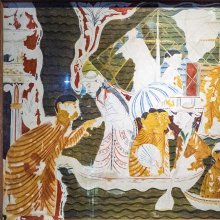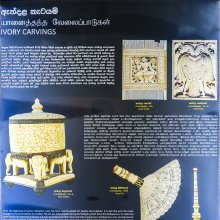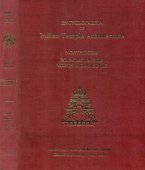Kara, Kārā, Kāra, Kaṟa, Kaṟā: 38 definitions
Introduction:
Kara means something in Buddhism, Pali, Hinduism, Sanskrit, Jainism, Prakrit, the history of ancient India, Marathi, Hindi, biology, Tamil. If you want to know the exact meaning, history, etymology or English translation of this term then check out the descriptions on this page. Add your comment or reference to a book if you want to contribute to this summary article.
Alternative spellings of this word include Kaar.
Images (photo gallery)
(+15 more images available)
In Hinduism
Purana and Itihasa (epic history)
Source: archive.org: Shiva Purana - English TranslationKara (कर) refers to the “hands”, according to the Śivapurāṇa 2.4.10 (“Boasting of Tāraka”).—Accordingly, as Kumāra (Kārttikeya) said to the Mountains: “O mountains, O fortunate sirs, do not be vexed, or worried. Even as you stand looking on I will kill this sinner. Consoling the mountains, the gods and the Gaṇas thus, and bowing to Śiva and Pārvatī he took up his brilliant spear. The heroic Kumāra, son of Śiva the great lord, with the spear in his hand (kara-śakti) shone in his resolve to kill Tāraka. [...]”.
Source: Cologne Digital Sanskrit Dictionaries: The Purana Index1a) Kara (कर).—(tax) not levied in Śākadvīpa;1 levied by Sagara over the conquered;2 to be levied and taken in instalments; fresh taxes lead to discontent among peoples.3
- 1) Vāyu-purāṇa 49. 103; 59. 124; 108. 70; Brahmāṇḍa-purāṇa II. 19. 106.
- 2) Brahmāṇḍa-purāṇa III. 49. 7; 52. 41.
- 3) Matsya-purāṇa 217. 3; 226. 11; 238. 14.
1b) A measurement of length.*
- * Matsya-purāṇa 274. 25.
Kara (कर) is a name mentioned in the Mahābhārata (cf. I.52.8, I.57) and represents one of the many proper names used for people and places. Note: The Mahābhārata (mentioning Kara) is a Sanskrit epic poem consisting of 100,000 ślokas (metrical verses) and is over 2000 years old.

The Purana (पुराण, purāṇas) refers to Sanskrit literature preserving ancient India’s vast cultural history, including historical legends, religious ceremonies, various arts and sciences. The eighteen mahapuranas total over 400,000 shlokas (metrical couplets) and date to at least several centuries BCE.
Vyakarana (Sanskrit grammar)
Source: Wikisource: A dictionary of Sanskrit grammarKāra (कार).—An affix, given in the Prātiśākhya works and,by Kātyāyana also in his Vārttika, which is added to a letter or a phonetic element for convenience of mention; e.g. इकारः, उकारः (ikāraḥ, ukāraḥ) ; cf. वर्णः कारोत्तरो वर्णाख्या (varṇaḥ kārottaro varṇākhyā); वर्णकारौ निर्देशकौ (varṇakārau nirdeśakau) Tai. Pra.I. 16: XXII.4.;cf. also V. Pr. 1.37. It is also applied to syllables or words in a similar way to indicate the phonetic element of the word as apart from the sense of the word: e. g.' यत एवकारस्तती-न्यत्रावधारणम् (yata evakārastatī-nyatrāvadhāraṇam) Vyak. Paribhāṣā , cf. also the words वकारः, हिंकारःः (vakāraḥ, hiṃkāraḥḥ) (2) additional purpose served by a word such as an adhikāra word; cf. अधिकः कारः, पूर्वविप्रतिषेघा न पठितव्या भवन्ति (adhikaḥ kāraḥ, pūrvavipratiṣeghā na paṭhitavyā bhavanti) M. Bh. on P.I.3.11.

Vyakarana (व्याकरण, vyākaraṇa) refers to Sanskrit grammar and represents one of the six additional sciences (vedanga) to be studied along with the Vedas. Vyakarana concerns itself with the rules of Sanskrit grammar and linguistic analysis in order to establish the correct context of words and sentences.
Ayurveda (science of life)
Source: gurumukhi.ru: Ayurveda glossary of terms1) Kāra (कार):—It’s a source of water which comes under Antariksha Jala (rain water). Water which is drawn after liquefication of hail stones. Qualities of this water are pure and soft.
2) Kara (कर):—[karaḥ] Hand or Manus. the part of the body attached to the forearm at wrist

Āyurveda (आयुर्वेद, ayurveda) is a branch of Indian science dealing with medicine, herbalism, taxology, anatomy, surgery, alchemy and related topics. Traditional practice of Āyurveda in ancient India dates back to at least the first millenium BC. Literature is commonly written in Sanskrit using various poetic metres.
Vastushastra (architecture)
Source: OpenEdition books: Architectural terms contained in Ajitāgama and RauravāgamaKara (कर) refers to “running cubit (24 fingers) § 2.1.”.—(For paragraphs cf. Les enseignements architecturaux de l'Ajitāgama et du Rauravāgama by Bruno Dagens)

Vastushastra (वास्तुशास्त्र, vāstuśāstra) refers to the ancient Indian science (shastra) of architecture (vastu), dealing with topics such architecture, sculpture, town-building, fort building and various other constructions. Vastu also deals with the philosophy of the architectural relation with the cosmic universe.
Jyotisha (astronomy and astrology)
Source: Wisdom Library: Brihat Samhita by VarahamihiraKara (कर) refers to the “hands”, according to the Bṛhatsaṃhitā (chapter 2), an encyclopedic Sanskrit work written by Varāhamihira mainly focusing on the science of ancient Indian astronomy astronomy (Jyotiṣa).—Accordingly, “We shall now proceed to give a brief description of (the qualifications of) a jyotiṣaka. He must be of noble birth and of agreeable appearance; meek, truthful and without jealousy; of proportional limbs; of joints well built and of good growth; have no physical defects; be of fine hands [i.e., kara], feet, nails, eyes, chin, teeth, ears, forehead, eye-brows and head; of fine physique and of high, sonorous voice”.

Jyotisha (ज्योतिष, jyotiṣa or jyotish) refers to ‘astronomy’ or “Vedic astrology” and represents the fifth of the six Vedangas (additional sciences to be studied along with the Vedas). Jyotisha concerns itself with the study and prediction of the movements of celestial bodies, in order to calculate the auspicious time for rituals and ceremonies.
Shaivism (Shaiva philosophy)
Source: Brill: Śaivism and the Tantric TraditionsKara (कर) refers to the “hands”, according to the Halāyudhastotra verse 34-35.—Accordingly, “The visitation of the wives of the distinguished sages in the Pine Park, the oblation with seed in Fire, the twilight dance: Your behaviour is not reprehensible. O Three-eyed one! The doctrines of the world do not touch those who have left worldly life, having passed far beyond the path of those whose minds are afflicted by false knowledge. The gods all wear gold and jewels as an ornament on their body. You do not even wear gold the size of a berry on your ear or on your hand (kara). The one whose natural beauty, surpassing the path [of the world], flashes on his own body, has no regard for the extraneous ornaments of ordinary men”.

Shaiva (शैव, śaiva) or Shaivism (śaivism) represents a tradition of Hinduism worshiping Shiva as the supreme being. Closely related to Shaktism, Shaiva literature includes a range of scriptures, including Tantras, while the root of this tradition may be traced back to the ancient Vedas.
Kama-shastra (the science of Love-making)
Source: Brill: Śaivism and the Tantric Traditions (kāmasūtra)Kara (कर) refers to the “hand”, according to the Kāmasūtra of Vātsyāyana and Jaśodhara’s commentary called the Jayamaṅgalā .—Accordingly, “[When you are] about to practise sex, [first you should] rub her genitalia with your hand (kara—kareṇopamardanaṃ), and when there is dampness, the sexual act can be commenced. This is the restoration of passion”.

Kamashastra (कामशास्त्र, kāmaśāstra) deals with ancient Indian science of love-making, passion, emotions and other related topics dealing with the pleasures of the senses.
Ganitashastra (Mathematics and Algebra)
Source: archive.org: Hindu MathematicsKara (कर) represents the number 2 (two) in the “word-numeral system” (bhūtasaṃkhyā), which was used in Sanskrit texts dealing with astronomy, mathematics, metrics, as well as in the dates of inscriptions and manuscripts in ancient Indian literature.—A system of expressing numbers by means of words arranged as in the place-value notation was developed and perfected in India in the early centuries of the Christian era. In this system the numerals [e.g., 2—kara] are expressed by names of things, beings or concepts, which, naturally or in accordance with the teaching of the Śāstras, connote numbers.

Ganitashastra (शिल्पशास्त्र, gaṇitaśāstra) refers to the ancient Indian science of mathematics, algebra, number theory, arithmetic, etc. Closely allied with astronomy, both were commonly taught and studied in universities, even since the 1st millennium BCE. Ganita-shastra also includes ritualistic math-books such as the Shulba-sutras.
Sports, Arts and Entertainment (wordly enjoyments)
Source: archive.org: Syainika Sastra of Rudradeva with English Translation (art)Kara (कर) refers to the “rays (of the sun)”, according to the Śyainika-śāstra: a Sanskrit treatise dealing with the divisions and benefits of Hunting and Hawking, written by Rājā Rudradeva (or Candradeva) in possibly the 13th century.—Accordingly, [while discussing the treatment of hawks]: “[...] [Hawks] should be kept on a platform in a garden, well-guarded by porters and cooled with the water from artificial streams shaded with tall trees standing close to each other, where the fierce rays of the sun (caṇḍāṃśu-kara) cannot penetrate. [...]”.

This section covers the skills and profiencies of the Kalas (“performing arts”) and Shastras (“sciences”) involving ancient Indian traditions of sports, games, arts, entertainment, love-making and other means of wordly enjoyments. Traditionally these topics were dealt with in Sanskrit treatises explaing the philosophy and the justification of enjoying the pleasures of the senses.
In Buddhism
Mahayana (major branch of Buddhism)
Source: Wisdom Library: Maha Prajnaparamita SastraKārā (कारा) refers to a “prison”, according to Mahāprajñāpāramitāśāstra (chapter 48).—Accordingly, “[Question].—[Emptiness of beings (sattvaśūnyatā) and emptiness of dharmas] are two ways of teaching inner and outer emptiness. Which one is true? [Answer].—Both are true. For disciples of little knowledge and weak faculties, only the emptiness of beings is first taught, and for beings of great knowledge and keen faculties, the emptiness of dharmas is taught. [The Hīnayānist Śrāvaka] is like a prisoner (kārāstha) who breaks his bonds (bandhana), kills the prison guard (kārā-adhyakṣa) and can leave at will; [the Mahāyānist is like this other one] who, out of fear of brigands (caura), makes a hole in the wall and escapes (niḥsaraṇa)”.
Source: academia.edu: A Study and Translation of the GaganagañjaparipṛcchāKāra (कार) refers to “performing (deeds)”, according to the Gaganagañjaparipṛcchā: the eighth chapter of the Mahāsaṃnipāta (a collection of Mahāyāna Buddhist Sūtras).—Accordingly, “Son of good family, there are eight purities of the insight (prajñā) of the Bodhisattvas. What are the eight? To with, [...] (5) although they teach four summaries of the dharma, they never see anything in impermanence, suffering, selfless, or quiescence; (6) although they teach to enter into action and duties, they are free from karmic result and also not disturbed by performing deeds (karma-kāra); (7) although they are established in the knowledge of teachings which is beyond discursive thinking, they elucidate the division of words of all teachings; (8) they attain the illumination of all teachings and teach living beings about impurity and purification”.

Mahayana (महायान, mahāyāna) is a major branch of Buddhism focusing on the path of a Bodhisattva (spiritual aspirants/ enlightened beings). Extant literature is vast and primarely composed in the Sanskrit language. There are many sūtras of which some of the earliest are the various Prajñāpāramitā sūtras.
In Jainism
Jain philosophy
Source: archive.org: Anekanta Jaya Pataka of Haribhadra SuriKarā (करा) (Gujarati; in Sanskrit: Karaka) refers to “hail”, as occurring in the Anekāntajayapatākā-prakaraṇa, a Śvetāmbara Jain philosophical work written by Haribhadra Sūri.—[Cf. Vol. I, P. 278, l. 8]—‘Hima’ is ‘snow’, ‘Tuṣāra’ frost, and ‘Karaka’ (Gujarati, karā) hail. All these three words occur on p. 283, l. 19.
-
General definition (in Jainism)
Source: OpenEdition books: VividhatīrthakalpaḥKara (कर) refers to a unity of measurement corresponding to a hasta, and represents a Jaina technical term mentioned in the Vividhatīrthakalpa by Jinaprabhasūri (13th century A.D.): an ancient text devoted to various Jaina holy places (tīrthas).
Source: The University of Sydney: A study of the Twelve ReflectionsKara (कर) refers to the “hand”, according to the 11th century Jñānārṇava, a treatise on Jain Yoga in roughly 2200 Sanskrit verses composed by Śubhacandra.—Accordingly, “Truly, life perishes exceedingly quickly like water lying in the hand [com.—kara-sthita-jalavat—‘like water resting on the hand’] [and] youth perishes like snow passes from the petal of a lotus”.

Jainism is an Indian religion of Dharma whose doctrine revolves around harmlessness (ahimsa) towards every living being. The two major branches (Digambara and Svetambara) of Jainism stimulate self-control (or, shramana, ‘self-reliance’) and spiritual development through a path of peace for the soul to progess to the ultimate goal.
India history and geography
Source: Cologne Digital Sanskrit Dictionaries: Indian Epigraphical GlossaryKara.—(IE 8-5), explained by a commentator as ‘the dues (bhāga) to be realised by the king for the enjoyment of royal land by using it for cultivation and for grazing cattle’; tax in general. (IE 8-5) rent or tax to be paid in grains when mentioned side by side with hiraṇya. (HRS), tax in general, according to the lexicons; accord- ing to the Arthaśāstra, (1) periodical tax over and above the king's customary grain-share; (2) emergecy tax levied upon the villagers over and above the normal grain-share; (3) tax upon merchants' profits. (EI 29; Chamba; CITD), a tax or impost; royal revenue; rent, dues; toll, tribute. (IE 7-1-2), ‘two’. Note: kara is defined in the “Indian epigraphical glossary” as it can be found on ancient inscriptions commonly written in Sanskrit, Prakrit or Dravidian languages.

The history of India traces the identification of countries, villages, towns and other regions of India, as well as mythology, zoology, royal dynasties, rulers, tribes, local festivities and traditions and regional languages. Ancient India enjoyed religious freedom and encourages the path of Dharma, a concept common to Buddhism, Hinduism, and Jainism.
Biology (plants and animals)
Source: Wisdom Library: Local Names of Plants and DrugsKara in the Malayalam language is the name of a plant identified with Ficus tsjakela Burm.f. from the Moraceae (Mulberry) family having the following synonyms: Ficus tsjahela Burm. f.. For the possible medicinal usage of kara, you can check this page for potential sources and references, although be aware that any some or none of the side-effects may not be mentioned here, wether they be harmful or beneficial to health.
Kara [কঁৰা] in the Assamese language is the name of a plant identified with Falconeria insignis Royle from the Euphorbiaceae (Castor) family having the following synonyms: Sapium insigne, Falconeria malabarica, Excoecaria insignis.
Kara in the Malayalam language is the name of a plant identified with Elaeocarpus tuberculatus Roxb. from the Elaeocarpaceae (Rudraksh) family having the following synonyms: Elaeocarpus bilocularis.
Source: Google Books: CRC World Dictionary (Regional names)1) Kara in Ghana is the name of a plant defined with Sansevieria liberica in various botanical sources. This page contains potential references in Ayurveda, modern medicine, and other folk traditions or local practices It has the synonym Sansevieria chinensis Hort. ex Gentil (among others).
2) Kara in India is also identified with Catunaregam spinosa It has the synonym Randia floribunda (Roxb.) DC. (etc.).
3) Kara is also identified with Elaeocarpus serratus It has the synonym Elaeocarpus oblongus Wall. (etc.).
4) Kara is also identified with Elaeocarpus tuberculatus It has the synonym Monocera tuberculata (Roxb.) Wight & Arn..
5) Kara is also identified with Holarrhena pubescens It has the synonym Physetobasis macrocarpa Hassk. (etc.).
6) Kara is also identified with Strychnos nux-vomica It has the synonym Strychnos spireana Dop (etc.).
7) Kara is also identified with Toddalia asiatica It has the synonym Aralia labordei H. Lév. (etc.).
8) Kara in Ladakhi is also identified with Saccharum officinarum It has the synonym Saccharum officinarum var. brevipedicellatum Hack. (etc.).
9) Kara in Nigeria is also identified with Dichrostachys cinerea It has the synonym Cailliea glomerata (Forssk.) J.F. Macbr. (etc.).
10) Kara in Thailand is also identified with Hyptis suaveolens It has the synonym Marrubium indicum Thunb. (etc.).
Example references for further research on medicinal uses or toxicity (see latin names for full list):
· Annales du muséum national d’histoire naturelle (1806)
· Revisio Generum Plantarum (1891)
· Mémoires de l’Institut Égyptien (1901)
· Journal of Ethnopharmacology (1999)
· Journal of Economic and Taxonomic Botany (1986)
· Annalen des Wiener Museums der Naturgeschichte (1836)
If you are looking for specific details regarding Kara, for example side effects, extract dosage, diet and recipes, chemical composition, health benefits, pregnancy safety, have a look at these references.

This sections includes definitions from the five kingdoms of living things: Animals, Plants, Fungi, Protists and Monera. It will include both the official binomial nomenclature (scientific names usually in Latin) as well as regional spellings and variants.
Languages of India and abroad
Pali-English dictionary
Source: BuddhaSasana: Concise Pali-English Dictionarykara : (m.) 1. the hand; 2. a ray; 3. a tax; 4. the trunk of an elephant. (adj.), (in cpds.), doing; performing. || kāra (m.), deed; service; act of homage. (adj.), in cpds. such as rathakāra: maker. kārā (f.), a prison; jail.
Source: Sutta: The Pali Text Society's Pali-English DictionaryKārā, (f.) (cp. Sk. kārā) confinement, captivity, jail, in °bhedaka cora a thief who has broken out of jail Vin. I, 75. (Page 210)
— or —
Kāra, (fr. kār-, cp. Vedic kāra song of praise, which is, however, derived fr. kṛ=kir to praise; also Vedic °kāra in brāhma°, fr. kṛ) 1. abs. (a) deed, service, act of mercy or worship, homage: kāra-paṇṇaka J. VI, 24 (vegetable as oblation); appako pi kato kāro devûpapattiṃ āvahati “even a small gift of mercy brings about rebirth among the gods” PvA. 6. —kāraka one who performs a religious duty D. I, 61 (=DA. I, 170). (b) doing, manner, way: yena kārena akattha tena k° pavattamānaṃ phalaṃ “as you have done so will be the fruit” PvA. 45.—2. (-°) (a) the production or application of, i.e. the state or quality of ... : atta° one’s own state =ahaṃ kāra, individuality; para° the personality of others A. III, 337; citti° reflection, thought PvA. 26; see e.g. andha° darkness, sak° homage, etc.—balakkārena forcibly PvA. 68.—(b) as ttg. the item, i.e. particle, letter, sound or word, e.g. ma-kāra the letter m PvA. 52; ca-kāra the particle ca PvA. 15; sa-kāra the sound sa SnA 23.—(c) (adj. -n.) (cp. kara) one who does, handles or deals with: ayakāra iron-smith Miln. 331. (Page 209)
— or —
Kara, (fr. kṛ) 1. (adj.) (-°) producing, causing, forming, making, doing, e.g. anta° putting an end to; pabhaṃ causing splendour; pāpa° doing evil; divā° & divasa the day-maker, i.e. the sun; kaṇhabhāva° causing a “black” existence (of pāpakamma) J. IV, 9; padasandhi° forming a hiatus PvA. 52; vacana°, etc. ‹-› 2. (m) “the maker, ” i.e. the hand Mhvs 5, 255—256; 30, 67. —atikaraṃ (adv.) doing too much, going too far J. I, 431; —dukkara (a) difficult to do, not easy, hard, arduous S. I, 7; IV, 260; A. I, 286; IV, 31, 135; V, 202; +durabhisambhavo Sn. 429 701; Ud. 61; (n. nt.) something difficult, a difficult task A. I, 286 (cp. IV. 31); J. I, 395; Miln. 121, dukkara-kārikā “doing of a hard task, ” exertion, austerity M. I, 93; Nd2 262b. —sukara easy to do S. I, 9; II, 181; Dh. 163; Ud. 61; na sukaraṃ w. inf. it is not easy to ... D. I, 250; A. III, 52, 184; IV, 334.

Pali is the language of the Tipiṭaka, which is the sacred canon of Theravāda Buddhism and contains much of the Buddha’s speech. Closeley related to Sanskrit, both languages are used interchangeably between religions.
Marathi-English dictionary
Source: DDSA: The Molesworth Marathi and English Dictionarykara (कर).—m (S) Royal revenue, toll, tax, assessment, impost. 2 A settled allowance to certain orders in a village,--to the pāṭīla, kuḷakaraṇī, jōśī &c.; a sum or quantity in general fixed to be given. 3 A hand. 4 Attached to the names of towns, it implies Inhabitant. Ex. kāśīkara, puṇēkara. 5 As the last member of a compound in comp. with Sanskrit words, it implies Agent. Ex. prakāśakara, sukhakara, ānandakara. 6 ind It follows imitative particles. Ex. jhaṭakara, paṭakara, caṭakara, dhaḍakara. 7 f An unlucky day, viz. the day following an eclipse, that of either of the solstices, that of the death of a person in the village, the day of the burning of the hōḷī &c.
--- OR ---
kara (कर).—m unc (karaṇēṃ To do.) A doing; a hand or concern in. Pr. jyālā kara nāhīṃ tyālā ḍara nāhīṃ. 2 Used for karī as in majūrakara, kāṭhakara, pōyakara.
--- OR ---
karā (करा).—See under kanhā.
--- OR ---
karā (करा).—f R Scum or film on the surface of water. 2 m The shooting of corn in the ear (after being stacked or cut).
--- OR ---
kāra (कार).—m A variety of the corn jōndhaḷā q. v. for all the varieties or species.
--- OR ---
kāra (कार).—f m The Trap rock or stone. 2 m (For karāra) Engagement, agreement, settlement. v kara, ṭharava. 3 m R Manure, compost. 4 A particle affixed to a letter in naming it. Ex. a, ka, ga, become akāra, kakāra, gakāra. 5 An affix to Sanskrit words, signifying Maker or doer. Ex. vastrakāra, śastrakāra. 6 (For kahāra) A palanquin-bearer.
--- OR ---
kārā (कारा).—f S A prison. In common use it requires an affix such as āgāra, gṛha &c. 2 Applied fig. to an irksome and confining business or occupation.
Source: DDSA: The Aryabhusan school dictionary, Marathi-Englishkara (कर).—m Tax. A hand. Concern in. f An unlucky day.
--- OR ---
karā (करा).—f Scum or film on the surface of water.
--- OR ---
kārā (कारा).—f kārāgṛha n A prison.
Marathi is an Indo-European language having over 70 million native speakers people in (predominantly) Maharashtra India. Marathi, like many other Indo-Aryan languages, evolved from early forms of Prakrit, which itself is a subset of Sanskrit, one of the most ancient languages of the world.
Sanskrit dictionary
Source: DDSA: The practical Sanskrit-English dictionaryKara (कर).—a. (-rā or -rī) [करोति, कीर्यते अनेन इति, कृ-कॄ-अप् (karoti, kīryate anena iti, kṛ-kṝ-ap)] (Mostly at the end of comp.) Who or what does, makes or causes &c.; दुःख°, सुख°, भय° (duḥkha°, sukha°, bhaya°) &c.
-raḥ 1 A hand; करं व्याधुन्वत्याः पिबसि रतिसर्वस्वमधरम् (karaṃ vyādhunvatyāḥ pibasi ratisarvasvamadharam) Ś.1.24.
2) A ray of light, beam; यमुद्धर्तुं पूषा व्यवसित इवालम्बितकरः (yamuddhartuṃ pūṣā vyavasita ivālambitakaraḥ) V.4.34; also प्रतिकूलतामुपगते हि विधौ विफलत्वमेति बहुसाधनता । अवलम्ब- नाय दिनभर्तुरभून्न पतिष्यतः करसहस्रमपि (pratikūlatāmupagate hi vidhau viphalatvameti bahusādhanatā | avalamba- nāya dinabharturabhūnna patiṣyataḥ karasahasramapi) Śiśupālavadha 9.6 (where the word is used in sense 1 also).
3) The trunk of an elephant; सेकः सीकरिणा करेण विहितः (sekaḥ sīkariṇā kareṇa vihitaḥ) Uttararāmacarita 3.16; Bhartṛhari 3.2.
4) A tax, toll, tribute; युवा कराक्रान्तमहीमृदुच्चकैरसंशयं संप्रति तेजसा रविः (yuvā karākrāntamahīmṛduccakairasaṃśayaṃ saṃprati tejasā raviḥ) Śiśupālavadha 1.7; (where kara means 'ray' also) (dadau) perhaps in this sense the word is used in neuter gender also. निर्ल्लज्जो मम च करः कराणि भुङ्क्ते (nirllajjo mama ca karaḥ karāṇi bhuṅkte) Pañch.2.3. अपरान्तमहीपालव्याजेन रघवे करम् (aparāntamahīpālavyājena raghave karam) R.4.58; Manusmṛti 7.128.
5) Hail.
6) A particular measure of length equal to 24 thumbs.
7) The asterism called हस्त (hasta).
8) A means or expedient.
9) A doer.
--- OR ---
Kāra (कार).—a. (-rī f.) [कृ-घञ् (kṛ-ghañ)] (At the end of comp.) Making, doing, performing, working, maker, doer, author; ग्रन्थकारः (granthakāraḥ) author; कुम्भकारः, सुवर्णकारः (kumbhakāraḥ, suvarṇakāraḥ) &c. &c.
-raḥ 1 Act, action; as in पुरुषकार (puruṣakāra).
2) A term denoting a sound or a word which is not inflected; as अकार (akāra) Manusmṛti 2.76,125; ककार, फूत्कार (kakāra, phūtkāra) &c.
3) Effort, exertion; 'कारौ वधे निश्चये च बले यत्ने रतावपि (kārau vadhe niścaye ca bale yatne ratāvapi)' इति विश्वः (iti viśvaḥ). Śiśupālavadha 19.27.
4) Religious austerity.
5) A husband, lord; master.
6) Determination.
7) Power, strength.
8) A tax or toll.
9) A heap of snow.
1) The Himālaya mountain.
11) Water produced by hail.
12) Killing, slaughter.
--- OR ---
Kārā (कारा).—
1) Imprisonment, confinement.
2) A prisonhouse, a jail; Mv.6.25.
3) Part of a lute below the neck.
4) Pain, affliction.
5) A female messenger.
6) A female worker in gold.
7) A sound.
8) An instrument for drawing the sound of the lute.
Source: Cologne Digital Sanskrit Dictionaries: Edgerton Buddhist Hybrid Sanskrit DictionaryKara (कर).—(-kara) (m. or nt.; apparently related to Sanskrit and Pali kaṭaka; also karaka; see next), ring on which the alms- bowl is fastened; only in pātra-kara-vyagra-hasta: Divyāvadāna 48.21; 159.9; 281.24; Avadāna-śataka i.347.10.
Source: Cologne Digital Sanskrit Dictionaries: Shabda-Sagara Sanskrit-English DictionaryKara (कर).—mfn.
(-raḥ-rā-rī-raṃ) Who or what does, makes or causes, as kiṅkaraḥ a servant, who does anything; bhayaṅkaraḥ frightful, what causes fear; upakaraḥ who gives aid: apakaraḥ who does ill, &c. m.
(-raḥ) 1. A ray of light, a sun or moonbeams. 2. Royal revenue toll, tax, impost, &c. 3. The hand. 4. Hail. 5. An elephant’s trunk. E. kṛñ to do, &c. ṭa or ap aff.
--- OR ---
Kāra (कार).—mfn.
(-raḥ-rī-raṃ) Who or what does any act, (but used chiefly in composition with other words:) the agent, a maker or doer; as kumbhakāra a potter, a maker of earthen vessels. svarṇakāra a goldsmith, &c. m.
(-raḥ) 1. Act, action. 2. Killing, slaughter. 3. Certainty. 4. Effort, exertion. 5. Religious austerity. 6. A heap of snow, or a mountain covered with it. 7. Tax, toll, royal revenue. 8. A master, a lord. f.
(-rā) 1. A prison. 2. Binding, confinement. 3. A female messenger. 4. The part of a lute below the neck. 5. A female worker in gold, (hemakārikā.) 6. Pain, affliction. E. kṛñ to make, to do, with ghañ or aṇ affix, in the latter case the fem. affix is ṅīṣ.
Source: Cologne Digital Sanskrit Dictionaries: Benfey Sanskrit-English DictionaryKara (कर).—i. e. A kṛ + a, I. latter part of comp. adj. and subst., f. rī, Making, causing, producing; e. g. vaira-, Causing enmity, [Mānavadharmaśāstra] 9, 227. a-yaśas-, Causing disgrace, [Hiḍimbavadha] 3, 18. deha-, m. A father, Mahābhārata 5, 3657. Ii. m. 1. The hand, [Mānavadharmaśāstra] 5, 136. 2. An elephant’s trunk, [Nala] 13, 12. B. kṛ10 + a, m. 1. A ray of light, [Rāmāyaṇa] 6, 11, 44. 2. Hail. 3. Royal revenue, [Mānavadharmaśāstra] 7, 128; toll, [Mānavadharmaśāstra] 7, 127.
--- OR ---
Kāra (कार).—i. e. kṛ + a, I. adj., f. rī. Latter part of a comp. adj. Making, a maker of, e. g. andha-kāra, māla -kāra, ratha-kāra. danta-, m. An artist in ivory, [Rāmāyaṇa] 2, 83, 14. dyūta- (vb. div. ) m. A gamester, [Pañcatantra] i. [distich] 431. parva(n)-, adj. Working at festivals. bhasma(n)-, m. A washerman. su-varṇa-, svarṇa-, and hema-, m. A goldsmith. Ii. m. Latter part of comp. substantives, Making. action. Cf. e. g. kāma-kāra, puruṣa-kāra; especially used after letters to form their name, e. g. a-kāra, the letter a; u-kāra, the letter u; ma-kāra, the letter ma(m), [Mānavadharmaśāstra] 2, 76.
--- OR ---
Kāra (कार).—i. e. kara + a, adj. Produced by hail, [Suśruta] 1, 170, 1.
--- OR ---
Kārā (कारा).—f. A gaol, [Daśakumāracarita] in Chr, 198, 9.
Source: Cologne Digital Sanskrit Dictionaries: Cappeller Sanskrit-English DictionaryKara (कर).—1. [feminine] ī (ā) making, doing, causing, producing (mostly —°); [masculine] the hand (lit. maker); an elephant’s trunk.
--- OR ---
Kara (कर).—2. [masculine] ray of light, sun-beam; revenue, tax, tribute.
--- OR ---
Kāra (कार).—1. [feminine] ī (—°) making, doing, performing, causing; [masculine] maker, author; sound, word.
--- OR ---
Kāra (कार).—2. [masculine] hymn, battle-song.
--- OR ---
Kārā (कारा).—[feminine] prison.
Source: Cologne Digital Sanskrit Dictionaries: Monier-Williams Sanskrit-English Dictionary1) Kara (कर):—1. kara mf(ī, rarely ā)n. (for 2. See p. 254, col. 3) (√1. kṛ), a doer, maker, causer, doing, making, causing, producing ([especially] ifc.; cf. duḥkhakara, bhayaṃ-k, sampat-k, etc.; cf. [Latin] cerus, ‘creator’), [Atharva-veda xii, 2, 2; Manu-smṛti; Pañcatantra] etc.
2) helping, promoting, [Ṛg-veda i, 116, 13]
3) m. the act of doing, making etc. (ifc.; cf. īṣatkara, su-k, duṣ-k, etc.)
4) ‘the doer’, the hand, [Ṛg-veda x, 67, 6; Mahābhārata; Manu-smṛti] etc.
5) a measure (the breadth of twenty-four thumbs)
6) an elephant’s trunk, [Mahābhārata; Pañcatantra] etc.
7) the claws of a crab, [Hitopadeśa]
8) symbolical expression for the number two
9) the lunar mansion Hasta, [Varāha-mihira’s Bṛhat-saṃhitā]
10) 2. kara m. (for 1. See p. 253, col. 1) (√kṝ), a ray of light, sunbeam, moonbeam, [Rāmāyaṇa; Meghadūta; Pañcatantra] etc.
11) hail, [cf. Lexicographers, esp. such as amarasiṃha, halāyudha, hemacandra, etc.]
12) royal revenue, toll, tax, tribute, duty, [Manu-smṛti; Yājñavalkya; Mahābhārata etc.]
13) Kāra (कार):—1. kāra mf(ī)n. (√1. kṛ, [Pāṇini 3-2, 23]), making, doing, working, a maker, doer (ifc. See kumbha-k, yajña k, suvarṇa-k)
14) an author (e.g. vārttika-k)
15) [according to] to some in [Ṛg-veda] also, ‘gain, prize, booty’; ‘contest, war’
16) m. (ifc.) an act, action (See kāma-k, puruṣa-k)
17) the term used in designating a letter or sound or indeclinable word (e.g. a-k, ka-k, qq.vv.; eva-k, the word eva; phūt-k q.v.), [Prātiśākhya; Manu-smṛti] etc.
18) effort, exertion, [cf. Lexicographers, esp. such as amarasiṃha, halāyudha, hemacandra, etc.]
19) determination, [cf. Lexicographers, esp. such as amarasiṃha, halāyudha, hemacandra, etc.]
20) religious austerity, [cf. Lexicographers, esp. such as amarasiṃha, halāyudha, hemacandra, etc.]
21) a husband, master, lord, [cf. Lexicographers, esp. such as amarasiṃha, halāyudha, hemacandra, etc.]
22) (as or ā) m. or f. act of worship, song of praise, [Divyāvadāna]
23) 2. kāra m. (= 2. kara) tax, toll, royal revenue, [Pāṇini 6-3, 10]
24) a heap of snow or a mountain covered with it, [cf. Lexicographers, esp. such as amarasiṃha, halāyudha, hemacandra, etc.]
25) mfn. produced by hail, [Suśruta]
26) 3. kāra m. (√2. kṛ), a song or hymn of praise, [Ṛg-veda]
27) a battle song, [Ṛg-veda]
28) 4. kāra m. (√2. kṝ), killing, slaughter, [cf. Lexicographers, esp. such as amarasiṃha, halāyudha, hemacandra, etc.]
29) Kārā (कारा):—f. (√1. kṛ?), a prison, [Vikramorvaśī; Daśakumāra-carita]
30) binding, confinement [gana] bhidādi
31) the part of a lute below the neck (for deadening the sound), [cf. Lexicographers, esp. such as amarasiṃha, halāyudha, hemacandra, etc.]
32) pain, affliction, [cf. Lexicographers, esp. such as amarasiṃha, halāyudha, hemacandra, etc.]
33) a female messenger, [cf. Lexicographers, esp. such as amarasiṃha, halāyudha, hemacandra, etc.]
34) a female worker in gold, [cf. Lexicographers, esp. such as amarasiṃha, halāyudha, hemacandra, etc.]
35) a kind of bird, [cf. Lexicographers, esp. such as amarasiṃha, halāyudha, hemacandra, etc.]
Source: Cologne Digital Sanskrit Dictionaries: Yates Sanskrit-English Dictionary1) Kara (कर):—(raḥ) 1. m. A ray of light; tax; the hand. a. Doing.
2) Kāra (कार):—[(raḥ-rī-raṃ) a.] Doing; maker. m. Act; killing; effort; certainty; heap; tax. f. (rā) A prison.
Source: DDSA: Paia-sadda-mahannavo; a comprehensive Prakrit Hindi dictionary (S)Kara (कर) in the Sanskrit language is related to the Prakrit words: Ara, Kara, Kare, Kāra, Kārava, Kārā, Gara, Gāra.
[Sanskrit to German]
Sanskrit, also spelled संस्कृतम् (saṃskṛtam), is an ancient language of India commonly seen as the grandmother of the Indo-European language family (even English!). Closely allied with Prakrit and Pali, Sanskrit is more exhaustive in both grammar and terms and has the most extensive collection of literature in the world, greatly surpassing its sister-languages Greek and Latin.
Hindi dictionary
Source: DDSA: A practical Hindi-English dictionary1) Kara (कर) [Also spelled kar]:—(nm) a hand; ray; the trunk of an elephant; tax, duty, custom; tribute; as a suffix it imparts the sense of an agency (e.g. [sukhakara]—that which gives pleasure); ~[tala] palm (of a hand); •[dhvani] clapping, also [karatāla; ~da, ~dātā] tributory; tax-paying or tax-payer; ~[deya] taxable; —[nirdhāraṇa] tax-assessment; ~[mukta] tax-free; —[saṃpuṭa] open palms placed side by side in a hollowed position.
2) Kāra (कार) [Also spelled kaar]:——a suffix denoting a doer, performer, e.g. [grathaṃkāra, citrakāra]; or a particular sound as [bhakāra, makāra]; (nf) a motor car.
3) Kārā (कारा):—(nf) a prison.
...
Prakrit-English dictionary
Source: DDSA: Paia-sadda-mahannavo; a comprehensive Prakrit Hindi dictionary1) Kara (कर) in the Prakrit language is related to the Sanskrit word: Kara.
2) Kara (कर) also relates to the Sanskrit word: Kara.
3) Kara (कर) also relates to the Sanskrit word: Kara.
4) Kāra (कार) also relates to the Sanskrit word: Kāra.
5) Kāra (कार) also relates to the Sanskrit word: Kāra.
6) Kāra (कार) also relates to the Sanskrit word: Kāra.
7) Kārā (कारा) also relates to the Sanskrit word: Kārā.
8) Kara (कर) also relates to the Sanskrit word: Kara.
Prakrit is an ancient language closely associated with both Pali and Sanskrit. Jain literature is often composed in this language or sub-dialects, such as the Agamas and their commentaries which are written in Ardhamagadhi and Maharashtri Prakrit. The earliest extant texts can be dated to as early as the 4th century BCE although core portions might be older.
Kannada-English dictionary
Source: Alar: Kannada-English corpusKara (ಕರ):—[adverb] = ಕರಂ [karam].
--- OR ---
Kara (ಕರ):—
1) [adjective] harsh; biting; severe.
2) [adjective] violent; impetuous.
--- OR ---
Kara (ಕರ):—[noun] any of a number of horselike perissodactylous mammals (family Equidae) having long ears and a short mane, which can be domesticated; an ass.
--- OR ---
Kara (ಕರ):—
1) [noun] the end part of the human arm beyond the wrist, including the fingers and thumb; the hand.
2) [noun] an elephant’s elongated prehensile nose; the trunk.
3) [noun] the length of the arm from the end of the middle finger to the elbow; a former unit of linear measure, about 18-22 inches (45.4-55.5 cm); a cubit.
4) [noun] a compulsory payment, usu. a percentage, levied on income, property value, sales price, etc. for the support of a government; a tax.
5) [noun] a payment made periodically by one state or ruler to another, esp. as a sign of dependence; tribute.
6) [noun] a ray of light.
7) [noun] water.
8) [noun] a cloud.
9) [noun] a liquid, usu. red and circulating in the arteries and veins of vertebrates, that carries oxygen to and carbon dioxide from the tissues of the body; blood.
10) [noun] an invisible gaseous substance surrounding the earth, a mixture mainly of oxygen and nitrogen; air.
11) [noun] a symbol for the number 2.
12) [noun] the cardinal number six; 6.
13) [noun] pellets of frozen rain falling in showers from cumulonimbus clouds; hail.
14) [noun] a small south constellation near Virgo; the Corvus.
--- OR ---
Kara (ಕರ):—[noun] a thing that may cause injury, pain, etc. ; a danger.
--- OR ---
Kāra (ಕಾರ):—
1) [noun] the taste that produces a burning sensation in the mouth, throat, etc.
2) [noun] sodium chloride, NaCl, a white, crystalline substance with a characteristic taste, found in natural beds, in sea water, etc., and used for seasoning and preserving foods, etc.; common salt.
3) [noun] (fig.) anger; wrath; fury.
--- OR ---
Kāra (ಕಾರ):—[noun] the state or condition of being confined in a prison; imprisonment.
--- OR ---
Kāra (ಕಾರ):—
1) [noun] the act or fact of doing, making, etc.
2) [noun] a compulsory payment levied on income, property value, sales price, etc. for the support of a government; a tax.
--- OR ---
Kāra (ಕಾರ):—[noun] a month in the Tuḷu calendar corresponding tot he period June-July; rainy season.
Kannada is a Dravidian language (as opposed to the Indo-European language family) mainly spoken in the southwestern region of India.
Tamil dictionary
Source: DDSA: University of Madras: Tamil LexiconKara (கர) [karattal] 12 transitive verb
1. To conceal, hide, disguise; மறைத்தல். தன்னு ளடக்கிக் கரக்கி னும் [maraithal. thannu ladakkig karakki num] (புறநானூறு [purananuru] 1, 8).
2. To steal, pilfer; கவர்தல். கழுத்தின தெழிலைச் சங்கங் கரந்தன [kavarthal. kazhuthina thezhilais sangang karanthana] (கந்தபு. மாயைப். [kanthapu. mayaip.] 48).
3. To withhold; to refuse to give; கொடா திருத்தல். (பிங்கலகண்டு) [koda thiruthal. (pingalagandu)]
4. To destroy, i.e., to reduce to primal elements; அழித்து முதற்காரணத்தோடு ஒடுக்குதல். காத்தும் படைத்துங் கரந்தும் விளையாடி [azhithu mutharkaranathodu odukkuthal. kathum padaithung karanthum vilaiyadi] (திருவாசகம் [thiruvasagam] 7, 12).
5. To join, unite with; அடைதல். பதுக்கையு மிருங்கதி கரக்கும் [adaithal. pathukkaiyu mirungathi karakkum] (உபதேசகாண்டம் சிவபுராண. [upathesagandam sivapurana.] 42). — intransitive
1. To hide, abscond, lie hidden, keep one’s self out of sight; மறைதல். கரந்துறை கணக்கும் [maraithal. karanthurai kanakkum] (மணிமேகலை [manimegalai] 2, 26).
2. To be injured, ruined; கெடுதல். படரும் புரங் கரப்ப [keduthal. padarum purang karappa] (திருக்கோவையார் [thirukkovaiyar] 213).
--- OR ---
Kara (கர) noun < khara. The 25th year of the Jupiter cycle of sixty years; வருஷம் அறுப தில் இருபத்தைந்தாவது. [varusham arupa thil irupathainthavathu.]
--- OR ---
Karā (கரா) noun probably from grāha.
1. A species of alligator; முதலை. கராவதன் காலினைக்கதுவ [muthalai. karavathan kalinaikkathuva] (நாலாயிர திவ்யப்பிரபந்தம் பெரியதி. [nalayira thivyappirapandam periyathi.] 2, 3, 9).
2. Male alligator; ஆண்முதலை. (பிங்கலகண்டு) [anmuthalai. (pingalagandu)]
--- OR ---
Kaṟa (கற) [kaṟattal] 12 transitive verb [Kanarese, Malayalam: kaṟa.]
1. To milk; பால்கறத்தல். ஆவின்பாலைக் கறந்துகொண் டாட்டக்கண்டு [palkarathal. avinpalaig karanthugon dattakkandu] (தேவாரம் [thevaram] 192, 3).
2. To yield milk, as a cow; பால்கொடுத்தல். இந்தப் பசு எத்தனைபடி கறக்கும் [palkoduthal. inthap pasu ethanaipadi karakkum]?
3. To misappropriate, as another’s property; to extort; கவர்தல். எதிரி சொத்துக்களை யெல்லாம் கறந்துகொண்டான். [kavarthal. ethiri sothukkalai yellam karanthugondan.] Local usage
--- OR ---
Kaṟā (கறா) noun probably from onom. Chirp of a quail; காடைக்குரல். [kadaikkural.] (W.)
--- OR ---
Kārā (காரா) [kār-ā] noun < கரு-மை [karu-mai] + ஆ⁸. [a⁸.] [Telugu: kārāvu, U. kārā.] Buffalo; எருமை. செங்கண் வன்கட் காரா [erumai. sengan vankad kara] (தஞ்சைவாணன் கோவை [thanchaivanan kovai] 380).
--- OR ---
Kārā (காரா) [kār-ā] noun < கரு-மை [karu-mai] + ஆ. [a.] [Telugu: kārāvu.] Black cow; கருநிறப் பசு. கன்றுபிரி காராவின் றுயருடைய கொடி [karunirap pasu. kanrupiri karavin ruyarudaiya kodi] (கம்பராமாயணம் குகப். [kambaramayanam kugap.] 66).
Tamil is an ancient language of India from the Dravidian family spoken by roughly 250 million people mainly in southern India and Sri Lanka.
See also (Relevant definitions)
Starts with (+1817): Kara angolam, Kara ba ka, Kara Bhattathiri Illam, Kara Bhattathiri Illam, Kara kaane, Kara Karyasiddhi, Kara kauji, Kara kong, Kara-adda, Kara-grama, Kara-k-kanciram, Kara-k-karunai, Kara-karikucha, Kara-lagaunu, Kara-medo-hagi, Kara-nadeshiko, Kara-nahim-tyala-dara-nahim, Kara-no-hagi, Kara-sato-kibi, Kara-shasana.
Ends with (+4095): A-kincit-pratikara, Abaddhaparikara, Abakara, Abhamkara, Abhamyakara, Abhayakara, Abhayamkara, Abhayankara, Abhihimkara, Abhihinkara, Abhikara, Abhinavavrittaratnakara, Abhiramavidyalamkara, Abhisambodhi-alankara, Abhisamskara, Abhisvikara, Abhivriddhikara, Abhyakara, Abhyalamkara, Abhyamkara.
Full-text (+4637): Karas, Bhaktakara, Karagupta, Karabhu, Akara, Karam, Karagara, Karapala, Andhakara, Rathakara, Supakara, Padukakara, Nikara, Karakara, Kamakara, Pratikara, Karakosha, Dravakara, Kshemakara, Vairakara.
Relevant text
Search found 152 books and stories containing Kara, Kārā, Kāra, Kaṟa, Kaṟā, Kāṟa, Karā, Kār-ā, Kar-a, Kaaraa, Karaa; (plurals include: Karas, Kārās, Kāras, Kaṟas, Kaṟās, Kāṟas, Karās, ās, as, Kaaraas, Karaas). You can also click to the full overview containing English textual excerpts. Below are direct links for the most relevant articles:
Brihad Bhagavatamrita (commentary) (by Śrī Śrīmad Bhaktivedānta Nārāyana Gosvāmī Mahārāja)
Appendix: The Ten-syllable mantra
Verse 2.2.205 < [Chapter 2 - Jñāna (knowledge)]
Verse 1.3.1-3 < [Chapter 3 - Prapañcātīta (beyond the Material Plane)]
Sahitya-kaumudi by Baladeva Vidyabhushana (by Gaurapada Dāsa)
Text 10.5 < [Chapter 10 - Ornaments of Meaning]
Text 10.109 < [Chapter 10 - Ornaments of Meaning]
Text 10.161 [Samuccaya] < [Chapter 10 - Ornaments of Meaning]
Garga Samhita (English) (by Danavir Goswami)
Verse 1.15.68 < [Chapter 15 - Revelation of the Universal Form to Nanda’s Wife]
Verse 1.9.15 < [Chapter 9 - Description of Vasudeva’s Wedding]
Verse 6.21.22 < [Chapter 21 - In the Description of the Third Fort, the Glories of Piṇḍāraka-tīrtha]
Rig Veda (translation and commentary) (by H. H. Wilson)
Shrimad Bhagavad-gita (by Narayana Gosvami)
Verse 17.15 < [Chapter 17 - Śraddhā-traya-vibhāga-yoga]
Verse 10.33 < [Chapter 10 - Vibhūti-yoga (appreciating the opulences of the Supreme Lord)]
Verse 2.2 < [Chapter 2 - Sāṅkhya-yoga (Yoga through distinguishing the Soul from the Body)]
List of Mahabharata tribes (by Laxman Burdak)
Related products
(+1 more products available)











